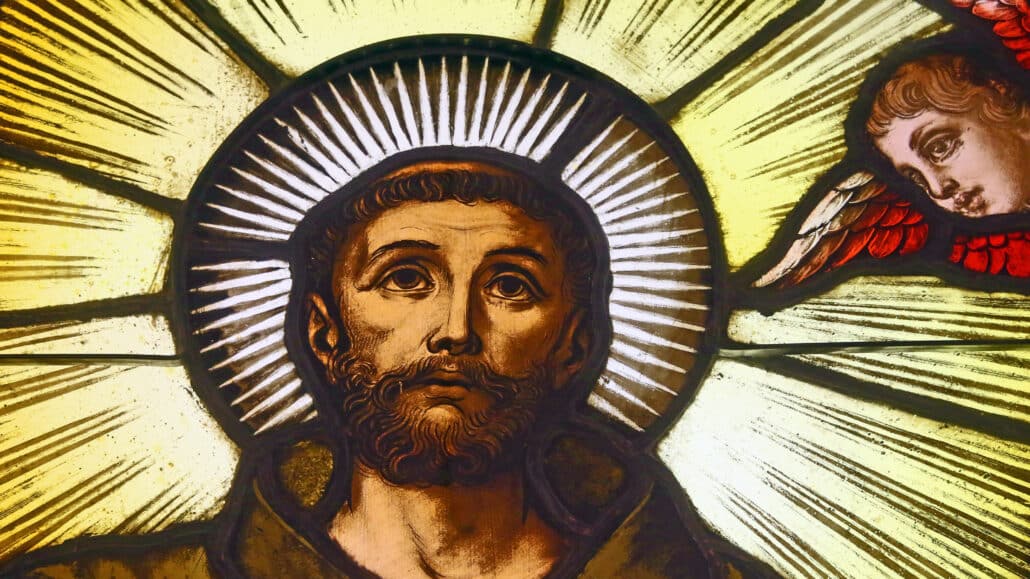
St. Francis: Lover of the Eucharist
The Eucharist, for St. Francis of Assisi, was the foundation on which his faith life was built. Consider the following quotes from this humble saint.
In his “Letter to All Clerics,” St. Francis wrote that, “in this world there is nothing of the Most High Himself that we can possess and contemplate with our eyes, except His body and blood.”
For the poor man of Assisi, the Eucharist was both his compass and his journey’s end.
“All those who refuse to do penance and receive the body and blood of our Lord Jesus Christ are blind, because they cannot see the true light, our Lord Jesus Christ.” – Letter to All the Faithful.
Humility is the heart of Franciscan spirituality. St. Francis showed, by word and by action, that only a humble and penitent spirit could be truly readied for a gift as important as the body and blood of Christ. St. Francis’ message here may seem severe, especially from a saint so fundamentally tied to simplicity and peace, but the directness of his message only illustrates his primal need for union with the divine.
“In his love, God gives Himself into our hands; we touch Him and receive Him daily into our mouths.” – Letter to All Clerics.
St. Francis takes a noticeably softer tone in this letter to clerics, but the heartbeat of his message is no less serious: When we receive the Eucharist – either by hand or by mouth – we are taking in essential food for the journey. The Eucharist, to St. Francis, offered the promise of everlasting life and guided him into a realm of greater compassion for his fellow man.
“We should visit churches often and show great reverence for the clergy, not just for them personally, for they may be sinners, but because of their high office, for it is they who administer the most holy body and blood of our Lord Jesus Christ.” – Letter to All the Faithful.
It might be difficult for 21st-century Catholics to mirror so pure a temperament toward the clergy as St. Francis did in his day. But look closer. He is acknowledging the importance of their station while recognizing clergy as sinners – just as we are. St. Francis saw all of life as threads in God’s vast tapestry, truly one unified body of Christ. And we cannot receive the Eucharist without dedicated clergy who serve as conduits for such a moment of grace.
“In all your sermons you shall tell the people of the need to do penance, impressing on them that no one can be saved unless he receives the body and blood of our Lord.” – Letter to Superiors of the Order.
It might surprise some to know that St. Francis was never ordained a priest. Historians opine that he didn’t think himself worthy and thus never progressed beyond the diaconate – which certainly falls in line with his humble character. But he nonetheless had stern words for priests in his order to guide their flock to Eucharist. It is within that sacrament, St. Francis understood, that we can find oneness with the Creator.
“O sublime humility! O humble sublimity! That the Lord of the whole universe, God and the Son of God, should humble Himself like this and hide under the form of a little bread, for our salvation.” – Letter to the General Chapter.
The life of St. Francis was plagued by trial, illness and great physical pain. One adjective seldom associated with the saint is joyful – but joy was a hallmark of his life and his life’s work. (Read his “Canticle of the Sun” for further proof.) What makes his message here so extraordinary is, first, a mastery of poetic language. He is, after all, considered one of the first Italian poets by scholars. But it is the joy and vigor behind his words that leave a mark. When we partake in the Eucharist, it is a solemn moment but also one of celebration and joy.
Hearts Afire
Thomas of Celano, an early friar and author of three hagiographies of St. Francis, wrote that the saint “burned with a love that came from his whole being for the sacrament of the Lord’s body.” And St. Francis sought to spread that fire to his brothers, to the lepers he embraced outside the walled city of Assisi, indeed to all those who longed for a closer relationship with God. It was the summit of his faith – and he wanted everybody at the table.
Francis of Assisi’s adoration of the Eucharist lit a fire in the hearts of those who have followed in his footsteps as daughters and sons of God. After 800 years, it burns there still.
Excerpted with permission from the Franciscan Spirit Blog by Christopher Heffron, Nov. 5, 2019.
Read more spiritual reflections by franciscanmedia.org: https://tinyurl.com/stfranciseucharist.

